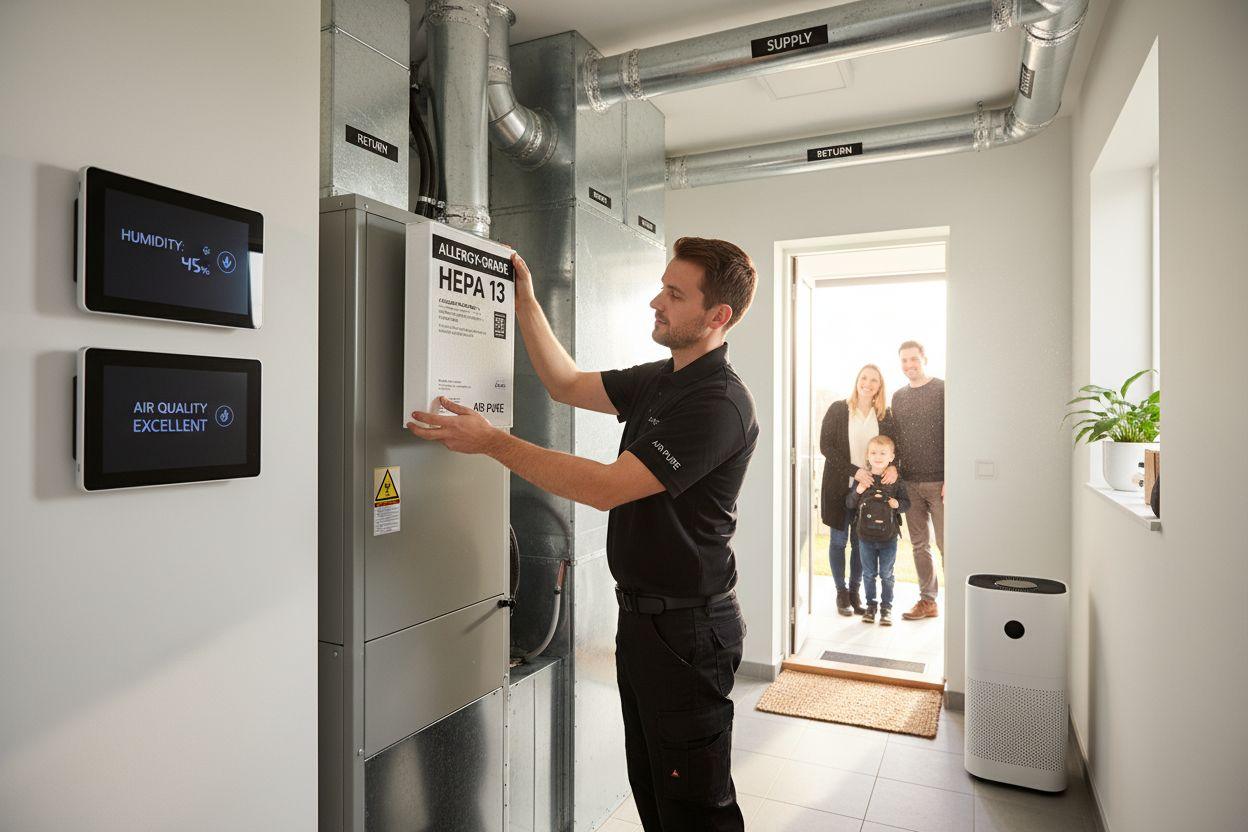
Did you know that Americans spend up to 90 percent of their time indoors, often breathing air that contains higher allergen levels than outside? For anyone sensitive to dust, pollen, or pet dander, every hour inside can become a struggle. The way your HVAC system handles air makes a huge difference in how safe and comfortable your home feels. Smart choices and regular care can turn your living space into a refuge from hidden airborne triggers.
Key Takeaways
| Point | Details |
|---|---|
| Importance of HVAC Systems | HVAC systems are essential in managing indoor air quality, particularly for allergy sufferers, and require proper maintenance and filter selection to minimize allergens. |
| Effective Filtration | Using high-efficiency filters (MERV 11-13, HEPA) and adhering to recommended replacement schedules are critical for effective allergen control in homes. |
| Strategic Air Purification | A multi-layered approach, including whole-house air purifiers and monitoring indoor humidity, greatly enhances indoor air quality and reduces allergens. |
| Common Mistakes | Avoid selecting low-efficiency filters and ineffective air cleaning technologies; always consider specific home needs for optimal HVAC performance against allergies. |
Table of Contents
- Understanding HVAC And Allergy Basics
- Types Of HVAC Systems For Allergy Control
- Essential Features For Allergy Reduction
- Integrating Air Purifiers And Filtration Solutions
- Common Mistakes When Selecting HVAC For Allergies
Understanding HVAC and Allergy Basics
Allergy sufferers know the battle for clean air is real. HVAC systems play a crucial role in determining indoor air quality, directly impacting how comfortable and healthy your living space can be. According to our guide on HVAC terminology, understanding how these systems interact with allergens is key to creating a breathable environment.
Research from the American College of Allergy, Asthma & Immunology highlights that central HVAC systems can significantly influence indoor allergen levels. Experts recommend using disposable air filters rated MERV 11-13, which effectively capture microscopic particles like:
- Pollen
- Pet dander
- Dust mites
- Mold spores
The design and maintenance of your HVAC system are critical. According to ASHRAE research, a well-maintained system can exclude most aeroallergens from indoor spaces, while a poorly managed system might actually spread and amplify allergens. This means regular filter changes, professional inspections, and understanding your system’s capabilities are not just maintenance tasks—they’re your first line of defense against airborne allergens.

For allergy sufferers, investing in the right HVAC configuration isn’t a luxury—it’s a necessity. By selecting appropriate filters, maintaining your system, and understanding its role in air quality, you can transform your home from an allergen battleground into a safe, breathable sanctuary.
Types of HVAC Systems for Allergy Control
Controlling indoor air quality for allergy sufferers requires strategic HVAC system selection. Our comprehensive guide on how HVAC systems work can help you understand the nuanced approaches to creating an allergen-resistant environment.
According to HVAC experts, several system types excel at managing indoor air quality. Whole-house air purification systems stand out as the most comprehensive solution. These integrated systems continuously filter allergens throughout your home, capturing microscopic particles like:
- Dust
- Pollen
- Pet dander
- Mold spores
Portable air purifiers with HEPA filters offer targeted supplemental protection for specific rooms. Research indicates these devices can effectively complement central HVAC systems, especially when equipped with appropriate Clean Air Delivery Rate (CADR) ratings. For maximum effectiveness, experts recommend maintaining indoor humidity between 30-50%, which can be achieved through integrated whole-house dehumidifiers and humidifiers that work alongside your primary HVAC system.
High-efficiency air filtration is your primary defense.
HEPA filters and high-MERV rated filters (11-13) provide superior particle capture, transforming your HVAC system from a potential allergen distributor into a powerful air purification tool. By selecting the right system and maintaining it properly, you can create a breathable, allergen-reduced indoor environment that supports your health and comfort.
Essential Features for Allergy Reduction
Creating an allergy-friendly indoor environment goes beyond simply selecting the right HVAC system. Air filtration technology plays a critical role in maintaining clean, breathable air. Learn more about HVAC system components that can enhance your home’s air quality and reduce allergen exposure.
According to allergen certification standards, high-performance air cleaners must demonstrate exceptional filtration capabilities. The Asthma & Allergy Friendly certification requires air cleaning systems to:
- Reduce airborne allergens by at least 90%
- Retain at least 50% of removed allergens in the filter
- Emit less than 0.1 mg/m³ of ozone
Filter replacement frequency is crucial for maintaining optimal air quality. Experts recommend more frequent filter changes for homes with pets or allergy sufferers—typically every 60 days. Different filter types have varying lifespans: HEPA filters last 6-12 months, pleated filters around 90 days, and fiberglass filters only about 30 days. This variation underscores the importance of understanding your specific filtration needs.

Here’s a comparison of common HVAC filter types and their effectiveness for allergy control:
| Filter Type | Particle Removal Efficiency | Typical Lifespan | Recommended For Allergy Sufferers |
|---|---|---|---|
| HEPA | 99.97% @ 0.3 µm | 6-12 months | Yes |
| MERV 11-13 | 65-85% of small particles | 60-90 days | Yes |
| Pleated | 50-70% of common allergens | ~90 days | With high MERV rating |
| Fiberglass | <20% of large particles | ~30 days | Not recommended |
Beyond filtration, consider additional features like UV light purification and humidity control. Maintaining indoor humidity between 30-50% can significantly reduce biological allergens, creating an environment that’s less hospitable to dust mites, mold, and other microscopic irritants. By investing in comprehensive air quality solutions, you’re not just filtering air—you’re creating a protective shield against potential allergy triggers.
Integrating Air Purifiers and Filtration Solutions
Allergy sufferers require a multi-layered approach to indoor air quality, and air purification systems are key to creating a breathable environment. Learn more about understanding HVAC filters, which play a crucial role in comprehensive air treatment.
Research indicates that the most effective air purifiers for allergies utilize advanced filtration technologies. True HEPA filters, capable of capturing 99.97% of particles as small as 0.3 µm, form the cornerstone of robust air cleaning solutions. Professional Indoor Air Quality (IAQ) experts recommend purification systems that combine multiple technologies:
- True HEPA filtration
- Activated carbon layers
- UV-C light sanitization
- Pre-filters for larger particles
The Clean Air Delivery Rate (CADR) is critical when selecting an air purification system. This metric helps match the purifier’s capacity to your specific room size, ensuring optimal performance. Professional IAQ systems integrated directly with central HVAC provide the most comprehensive solution, allowing for even air distribution and automated operation. These systems can be particularly effective for targeting specific pollutants, with real-time PM2.5 monitoring offering advanced protection for asthma and allergy sufferers.
Choosing the right air purification solution isn’t just about buying a device—it’s about creating a holistic approach to indoor air quality. By combining professional-grade filtration, strategic HVAC integration, and targeted pollutant removal, you can transform your living space into a sanctuary of clean, breathable air.
Common Mistakes When Selecting HVAC for Allergies
Allergy sufferers often unknowingly sabotage their indoor air quality through critical selection errors. Get insights on seasonal HVAC preparation to help prevent these common pitfalls and protect your respiratory health.
According to the American College of Allergy, Asthma & Immunology, several critical mistakes can compromise your HVAC system’s allergy-fighting capabilities. Many people mistakenly choose ineffective air cleaning technologies that can actually worsen air quality. Problematic options include:
- Ionic air cleaners that may produce harmful ozone
- UV-only purification units with limited particle removal
- Low-efficiency fiberglass furnace filters
- Units that don’t match room size or CADR requirements
Filter replacement frequency is another frequently overlooked aspect of HVAC maintenance. Experts recommend that homes with allergy sufferers replace filters every 60 days—significantly more often than the standard 90-day interval. Neglecting filter changes allows accumulated allergens to recirculate and can strain your HVAC system, reducing its overall efficiency and potentially causing additional respiratory challenges.
The most critical error is treating HVAC systems as a one-size-fits-all solution. Each home requires a tailored approach considering factors like local allergen types, humidity levels, and specific health needs. By understanding these common mistakes, you can make informed decisions that transform your HVAC system from a potential allergen distributor into a powerful air quality management tool.
Take Control of Allergies With Proven HVAC Solutions
Are you tired of the endless struggle against indoor allergens? If you want relief from pollen, dust, and pet dander in your Louisville or Southern Indiana home, Project HVAC understands your challenges. Many readers worry about finding the right HVAC system, choosing effective filters, and ensuring proper maintenance. You know that missing even one detail can let allergens slip through. We offer trusted guidance on how to use MERV-rated filters, proper humidity control, and advanced air purifiers—exactly the solutions you learned about in this article. For more resources on allergy-friendly upgrades, visit our HVAC Service and Repair page.

Ready to create an allergy-safe living space? Partner with a local team that combines decades of experience, same-day service, and custom air quality products. Don’t let another allergy season control your comfort. Schedule your personalized indoor air quality assessment at Project HVAC. Our experts are ready to help you breathe easier starting today.
Frequently Asked Questions
What type of HVAC system is best for reducing allergens in the home?
Whole-house air purification systems are the most effective for allergen reduction, as they continuously filter allergens from the entire home, capturing particles like dust, pollen, and pet dander.
How often should I replace HVAC filters for allergy control?
For homes with allergy sufferers or pets, it’s recommended to replace filters every 60 days. HEPA filters can last 6-12 months, pleated filters around 90 days, and fiberglass filters about 30 days.
What features should I look for in an HVAC system to improve indoor air quality?
Look for systems with high-efficiency air filtration (HEPA or MERV 11-13 filters), humidity control features, and additional options like UV light purification, which help reduce allergens significantly.
How does humidity control affect indoor allergens?
Maintaining indoor humidity between 30-50% helps reduce biological allergens by creating an environment less hospitable to dust mites, mold, and other irritants. This can be managed with whole-house dehumidifiers or humidifiers integrated with your HVAC system.
Recommended
- Understanding Humidity and HVAC Explained Simply – HVAC Service and Repair | Louisville, KY | Project Heating & Cooling
- Understanding HVAC Filters Guide: Importance and Function – HVAC Service and Repair | Louisville, KY | Project Heating & Cooling
- 7 Best Indoor Air Purifiers for Cleaner Air – HVAC Service and Repair | Louisville, KY | Project Heating & Cooling
- Seasonal HVAC Preparation: Get Your System Ready for 2025 – HVAC Service and Repair | Louisville, KY | Project Heating & Cooling
- HVAC DIY Maintenance How-To Guide
- Why Air Duct Cleaning is Important for Your Home – Colley Refrigeration

